The perpetuating of the Superman-as-gay-icon thing is bizarre. After seeing Bryan Singer‘s film last week I wrote that those speculating about echoes along these lines are “dreaming…this is a film about purity of spirit.” And Singer has said his Superman “is probably the most heterosexual character in any movie I’ve ever made”…and he’s not wrong. But the Guardian won’t let it go.
 Jeffrey Wells
Jeffrey Wells
Drive Me Nuts
John Ford‘s movies have been wowing and infuriating me all my life. A first-rate visual composer and one of Hollywood’s most economical story-tellers bar none, Ford made films that were always rich with complexity, understatements and undercurrents that refused to run in one simple direction.
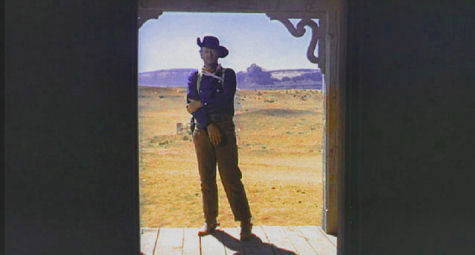
The closing shot of John Ford’s The Searchers
Ford’s films are always what they seem to be…until you watch them again and re-reflect, and then they always seem to be something more.
But the phoniness and jacked-up sentiment in just about every one of them can be oppressive, and the older Ford got the more he ladled it on.
The Irish clannishness, the tributes to boozy male camaraderie, the relentless balladeering over the opening credits of 90% of his films, the old-school chauvinism, the racism, the thinly sketched women, the “gallery of supporting players bristling with tedious eccentricity” (as critic David Thomson put it in his Biographical Dictionary of Film) and so on.
The treacliness is there but tolerable in Ford’s fine pre-1945 work — The Informer, Stagecoach, Young Mr. Lincoln , Drums Along the Mohawk, They Were Expendable , The Grapes of Wrath and My Darling Clementine .
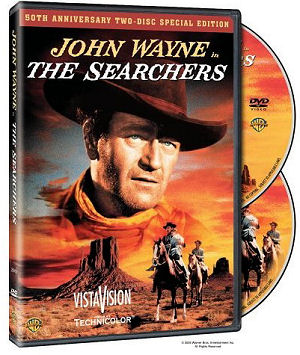
But it gets really thick starting with 1948’s Fort Apache and by the time you get to The Searchers, Ford’s undisputed masterpiece that came out in March of 1956, it’s enough to make you retch.
Watch the breathtaking beautiful new DVD of The Searchers, and see if you can get through it without choking. Every shot is a visual jewel, but except for John Wayne‘s Ethan Edwards, one of the most fascinating racist bastards of all time, every last character and just about every line in the film feels arch and ungenuine.
The phoniness gets so pernicious after a while that it seems to nudge this admittedly spellbinding film toward self-parody. Younger people who don’t “get” Ford (and every now and then I think I may be turning into one) have been known to laugh at it.
Jeffrey Hunter‘s Martin Pawley does nothing but bug his eyes, overact and say stupid exasperating lines all through the damn thing. Nearly every male supporting character in the film does the same. No one has it in them to hold back or play it cool — everyone blurts.
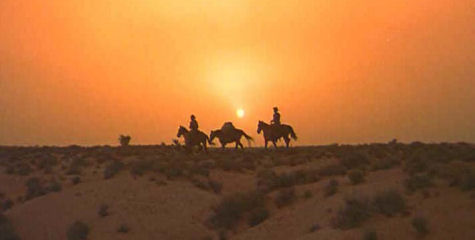
Ken Curtis‘s Charlie McCorry, Harry Carey Jr.’s Brad Jorgensen, Hank Worden‘s Mose Harper…characters I’ve come to despise by way of the grating artistry of John Ford.
I’ll always love the way Ford handles that brief bit when Ward Bond‘s Reverend Clayton sees Martha, the wife of Ethan’s brother, stroking Ethan’s overcoat and then barely reacts — perfect — but every time Bond opens his mouth to say something, he bellows like a bull moose.
You can do little else but sit and grimace through Natalie Wood‘s acting as Debbie (the kidnapped daughter of Ethan’s dead brother), Vera Miles‘ Laurie Jorgenson, and Beulah Archuletta‘s chubby Indian squaw (i.e., “Wild Goose Flying in the Night Sky”)…utterly fake in each and every gesture and utterance.
I realize there’s a powerful double-track element in the racism that seethes inside Ethan, but until he made Cheyenne Autumn Ford always portrayed Indians — Native Americans — as a kind of creepy, sadistic sub-species. The German-born, blue-eyed Henry Brandon as Scar, the Comanche baddie at the heart of The Searchers…’nuff said.
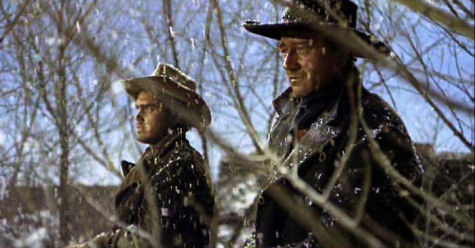
Jeffrey Hunter, John Wayne
That repulsive scene when Ethan and Martin look at four or five babbling Anglo women whose condition was caused, we’re informed, by having been raised by Indians, and some guy says, “Hard to believe they’re white” and Ethan says, “They ain’t white!”
I don’t know how to enjoy The Searchers any more except by wearing aesthetic blinders — by ignoring all the stuff that drives me up the wall in order to savor the beautiful heart-breaking stuff (the opening and closing shot, Wayne’s look of fear when he senses danger for his brother’s family, his picking up Wood at the finale and saying, “Let’s go home, Debbie”).
All I’m saying is, for a great film it takes an awful lot of work to get through it.
“The problem with the world is that fools and fanatics are always so sure of themselves but wiser people are full of doubt.” — Bertrand Russell quote embraced by Bill Maher to call attention to a new Maher-produced documentary about the state of religion in the world.
The Chinese government censors are so relentless…like termites, like beavers on amphetamine…and they just don’t quit with the lame-ass no-no’s.
Gyorgy Ligeti, a Hungarian composer who created one of the trippiest motion picture scores of all time with his work on Stanley Kubrick‘s 2001: A Space Odyssey , died today in Vienna at age 83. If you don’t remember the 2001 score, listen to an excerpt here and it’ll come right back to you.
Props to N.Y. Times columnist David Carr for not just sticking it to arch-conservative “hate-monger” Ann Coulter in the usual way…hah!
“Certainly one advantage of ‘youth’ in the arts is ignorance, to know so little as to be fearless. To not grasp that certain things one may dream up are actually impossible to do. When I finished Apocalypse Now I of course thought, ‘If I knew then what I know now, I wouldn’t have even tried [this].” Certainly old age brings ‘experience’ and that is not to be discounted, but in the arts, fearlessness is a more desirable genie than experience . Fearlessness is cousin to innovation, whereas experience can be the parent of fear. Once you’ve fallen out of the tree a few times; felt the pain of those bruised knees and suffered the embarrassment of the inevitable ridicule — it’s much more difficult to be as daring in what you do, or even what you attempt to do. So…I’ve decided the best course is to become an amateur and accept that I know next to nothing and love almost everything . Recently I realized that the favorite decade of my life was 50, a wonderful age for a man — at the peak of his health and experience, yet flexible enough to enjoy and also temper it. So reluctant was I to give up being in my fifties, that I began to call myself ‘fifty-ten’ or ‘fifty-eleven ‘. Now I’m ‘fiftysixteen’. And so today, like some inflated East European currency that gets two zeros lopped off, I’ve decided to lose the ’50’ and just be sixteen. Next year I’ll be seventeen, which is exactly the age that I was when I very seriously began to direct plays.” — Francis Coppola on certain dilemmas he’s faced in recent years, writing on his Youth Without Youth site.
“We are not here to be liked,” 20th Century Fox co-chairman Tom Rothman tells N.Y. Times reporter Laura Holson. “We don’t work for talent agencies. We work for Fox. Our job is not to worry about agents who jibber-jabber to reporters, who worry about headlines.” Co-chairman Jim Gianopulos tells Holson that that currying favor “is not tolerated around here from anyone; you are not going to get ahead scheming.”
Coming Home
Coming Home
Carl Colpaert’s G.I. Jesus is the first truly exceptional Cinevegas film I’ve seen so far.
Compared to the pickings over the last two days, this psychological domestic drama almost feels miraculous. The reception may be more muted out in the real world…who knows? But it’s certainly good enough to play at the Telluride or Toronto Film Festivals, and with some minor refinements it could even end up being distributed.
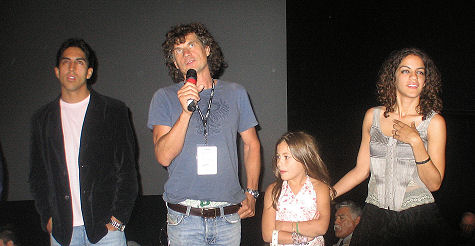
(l. to r.) G.I. Jesus costar Joe Arquette, director-writer Carl Colpaert, costars Telana Lynum and Patricia Mota following Sunday night’s screening — 8:05 pm.
This is a partly real, partly hallucinatory homecoming story that feels connected to a guilt current that seems to be popping up left and right these days among Iraqi War veterans. At times G.I. Jesus plays like a kind of Coming Home for the 20-something veterans of that conflict.
You know the drill: war veteran comes home, feels alienated and haunted, doesn’t relate, picks up evidence of marital infidelity, freaks out. But G.I. Jesus is trippier and more complex than that.
< ?php include ('/home/hollyw9/public_html/wired'); ?>
G.I. Jesus doesn’t unfold from a perspective of a conservative career officer like Bruce Dern’s Cpt. Bob Hyde, the Coming Home character who was heavily invested in the rightness of U.S. handling of the Vietnam War. It stems, rather, from the head of an obviously intelligent young Mexican-American Marine Corporal named Jesus Feliciano (Joe Arquette) who’s haunted by his actions during his time in Iraq.
G.I. Jesus is basically about ghosts from that conflict hovering around Jesus, and a growing feeling of betrayal and apartness between himself and his “Dominican princess” wife Claudia (Patricia Mota), whose materialistic ambitions seem, from his perspective, to be creating a gulf between them.
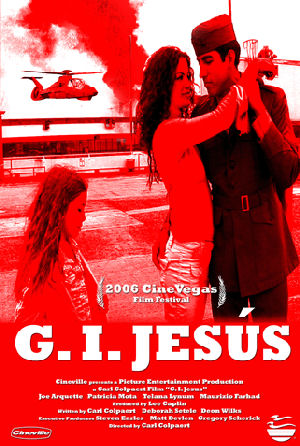
The signatures at work here are “honest,” “unforced,” “thoughtful.” G.I. Jesus has been shot on live video stock (so that it would blend with some real Iraqi war tapes provided by the BBC), which I found exciting, and it’s been extremely well cut by Wayne Kennedy and Nick Nehez, and nicely scored by Carlos Durango.
But there’s a dreamscape element running through the film (as it’s largely happening in Jesus’s head), and because of a decision by director-writer Colpaert to jettison a certain narrative line at the two-thirds mark, the ending, for me, doesn’t quite bring it all home.
I’m always a little bit thrown by movies that inject fantasy into a reality that’s been carefully constructed. Maybe there’s more to it than I realized and I need to see it again.
The key thing, it seems, is that Jesus’s Iraq memories haven’t been erased at the finale (far from it) and the hauntings continue. I’m not entirely sure if all the story strands have been fully dealt with by the finish, but it’s at least a debatable call, and there’s no dismissing the things in G.I. Jesus that succeed.

The film is an unquestioned triumph in the matter of Arquette (a very young Latino who’s costarring in Andrew Davis’s forthcoming The Guardian) and Mota’s performances. I believed every word and gesture from these two; everything they say and feel seems genuine.
Probably because the investment seems so complete. Jesus and Claudia have a young daughter, Marina (played by a 9 year-old firecracker named Telana Lynum), a home in a trailer park, and a texture to their characters — sexual attraction, emotional ties, credible backstory.
G.I. Jesus is certainly probing and complex, and the politics behind it are obviously of a leftist humanitarian bent. There’s a shot at one point of a painting meant to evoke the glories of the Bush policy in Iraq. I, for one, found it extremely spooky.
The program notes call G.I. Jesus “an ethereal journey of one man’s struggle…to let go of the pain and agony suffered in combat in order to get on with his life.” That’s not bad, but check out the trailer on the Cineville site for a better taste of it.
Colpaert is the founder of Cineville, and has executive produced several above-average films, including Swimming with Sharks, The Whole Wide World, Hurlyburly, One-Eyed King and The Velocity of Gary. Born in Europe (Belgium, I think) and an American Film Institute grad, Colpaert began as an editor working for legendary producer Roger Corman.
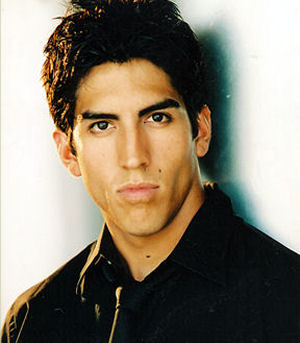
G.I. Jesus costar Joe Arquette. (The only decent shot I could find of the equally dynamic Patricia Mota is on the IMDB, and they don’t allow you to copy and paste.)
I’ve never heard of anything Colpaert has directed before this, but now that I’m stoked I’d like to see The Affair, which he directed and released in ’04.
I mentioned “minor refinements” at the beginning of this piece. Just cosmetic stuff, mainly.
There’s a white Fu Manchu moustache worn in the film by a uniformed American Colonel that I didn’t believe for a second. (Conservative Oliver North types wear only Clark Gable-type moustaches.) Another wrinkle is a young Marine recruitment officer whose hair is too long in the back. Maybe these style choices can be rectified digitally.
I took some pictures of the cast and crew at the Brenden Theatre #5 last night, and I was going to hit the after-party. But I made the mistake of going back to the room to start writing this and took a break on the bed for a second. That was it…out like a light.

“I would love to go off and make a picture like Capote or George Clooney’s Good Night, and Good Luck.” — Steven Spielberg mouthing the equivalent of creative crocodile tears to Peter Bart and Peter Guber during a segment of AMC’s “Sunday Morning Shootout” that aired this morning.
“Remember — all sequels are whore movies. You do the first one because you want to do something wonderful. You do the sequel for money.” — guy with heavy credits who’s done some laps around the track.
Haven’t seen the latest Entertainment Weekly with the story about the most controversial films ever, but good for Nikki Finke having written that while she “has no real problems with EW‘s list, it’s as if only the post-Star Wars prequel generation came up with it.” If, in fact, EW is deliberately skewing its reporting toward a younger demographic (as they seem to be), they’re surrendering whatever cinematic historical authority points they may have accumulated in past years. The story reportedly leaves out Brokeback Mountain, and also blows off (according to Finke) Carnal Knowledge, Easy Rider, Straw Dogs, Apocalypse Now, I Am A Fugitive From A Chain Gang, Dr. Strangelove, Gentlemen’s Agreement, Bad Day at Black Rock, Texas Chainsaw Massacre and Midnight Cowboy . “Not to mention the original Manchurian Candidate which after the JFK assassination was withdrawn from circulation for 25 years?,” Finke adds. “Or Song of the South, which is still Disney’s biggest embarrassment for showing “happy slaves” onscreen. And since they’re counting foreign films (Triumph of the Will is included), then where’s L’Age d’Or, for that matter? I could go on and on.” What about Birth of a Nation?
